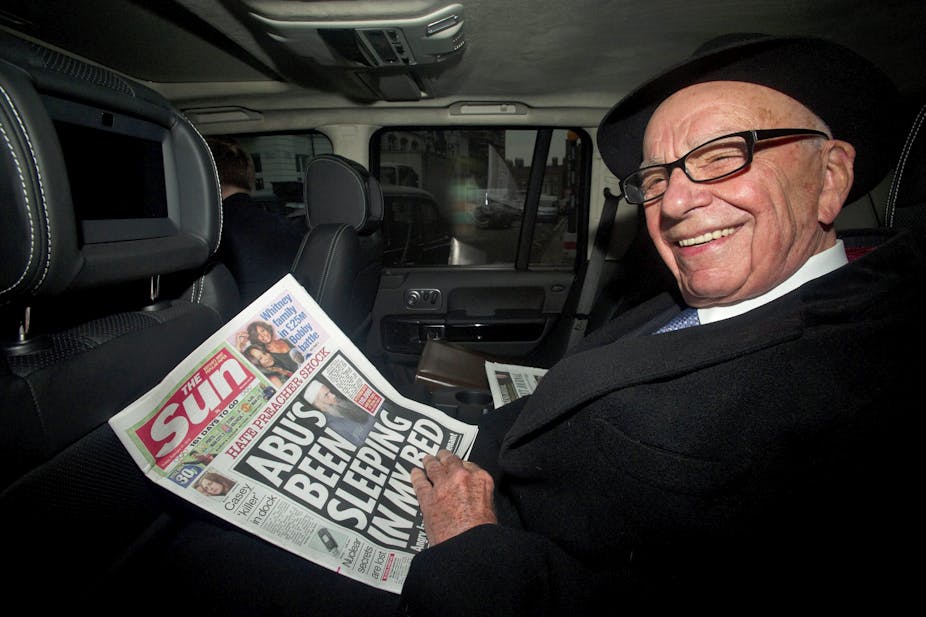News Corporation executive chairman Rupert Murdoch has been secretly recorded regretting the assistance given to authorities who were investigating allegations of phone hacking and corruption at his newspapers.
In a 45-minute recording of a speech to staff at his British newspaper The Sun made by a reporter in attendance and subsequently leaked to the press, the News Corporation boss also described payments to police and public officials as part of “the culture of Fleet Street”.
Of the police investigation, Murdoch added:
I mean, it’s a disgrace. Here we are, two years later, and the cops are totally incompetent.
In a statement, News Corporation said: “Mr Murdoch never knew of payments made by Sun staff to police before News Corporation disclosed that to UK Authorities. Furthermore, he never said he knew of payments. It’s absolutely false to suggest otherwise.”
The Conversation spoke with David McKnight, an Associate Professor in the Journalism and Media Research Centre at UNSW and author of Rupert Murdoch: An Investigation of Political Power, for his reaction to Murdoch’s comments.
What do these tapes tell us about what Rupert Murdoch knew about the phone hacking scandal and payments to police?
I didn’t see any reference that suggested that he knew all about it. What struck me about the whole thing is his remark that they were having the biggest inquiry ever over “next to nothing” and quote “next to nothing”.
That’s what he really thinks the phone hacking scandal and the payments to police amounts to. It’s an extraordinary contrast to the “humblest day of my life” public persona.
The other thing I thought was really striking was one of the journalists asked him “when are we going to hit back” and he said “we will”. It’s really a kind of ominous boasting that is very familiar to anyone who has studied Murdoch. It was just a sort of general disdain to the seriousness of the whole thing – the whole scandal.
What do these comments tell us about the culture at News Corp, given Murdoch made these comments in March 2013, well after the phone hacking scandal and the arrests of many staff?
In the book I wrote, I said that essentially what you had in News Corporation was a corporate culture of contempt for rules, and the unofficial motto of News Corp was “do whatever it takes, rules are for other people”. The company rewarded those who pushed the boundaries.
What this shows is that the corporate culture of contempt for rules is very lively besides all the public statements and even in spite of the cooperation that News International has given the police – nothing seems to have changed in Murdoch’s view of the world.
What implications, if any, does this have for Murdoch’s Australian operations?
The other thing about this and about the situation more generally in Australia, of course there is very little discussion of this, is that we’re moving to a situation here where the gradual weakening of Fairfax will essentially mean that Murdoch will have a quasi-monopoly of newspapers in Australia.
I think this culture of contempt for rules – I mean I can talk about it at great length – where it has a direct relevance to Australia – everyone says, and they’re probably right, that there has been no hacking in Australia – but the contempt for rules here takes the form of contempt of any notion of political balance in his newspapers.
He’s got newspapers, particularly in Brisbane and Melbourne, they already have a monopoly there. They’ve got the only newspaper in Darwin and Hobart, they’re competitors are weakening and if you look at those newspapers – and his most powerful newspapers the Herald Sun and the Daily Telegraph – not every columnist and comment is right-wing but the overwhelming bulk is. There is no sense of balance.
The newspapers we have seen recently have been used as campaign vehicles against the Gillard government, that’s what they were and we can expect more of this if Fairfax is broken up. All of this is significant because whatever people say about electronic media and new media, in all their problems, newspapers still generate the vast amount of original content and original reporting which is reproduced elsewhere and television and radio live of it. So newspapers are still central.
In a sense it’s not the newspapers, it’s the newsrooms. Even the broken business model of newspapers continues to support the biggest newsrooms in Australia – Murdoch understands that, and that’s why he is even toying with buying more newspapers even at this stage.

